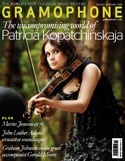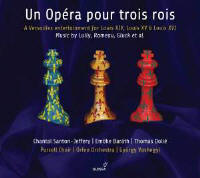Texte paru dans: / Appeared in: |
|
|
Outil de traduction (Très approximatif) |
|
|
Reviewer:
David Vickers This imaginary fête musicale is assembled from assorted works associated with the French court during the reigns of Louis XIV, Louis XV and Louis XVI – not just entertainments put on at Versailles, but also whenever the court was residing at Saint-Germain-enLaye, Fontainebleau and so on. Three soloists sing the allegorical roles Renown (or Fame), Glory and Apollo in this ‘Opera for Three Kings’ – no doubt devotees of neglected French operas of the Ancien Régime will experience an illuminating epiphany. Conducted expertly by György Vashegyi, the Budapest-based Purcell Choir and Orfeo Orchestra produce characterful panache, heroic swagger, balletic deftness and suave charm as each selection requires. Within the first few minutes there is a whistle-stop tour through the Overture from Lully’s Les plaisirs de l’île enchantée (1664), an idyllic chorus from Rameau’s Hippolyte et Aricie (1733), a valorous duet from Destouches’s Issé (1697) and a turbulent ritournelle from Mondonville’s Les fêtes de Paphos (1758). The Turkish march from Lully’s Le bourgeois gentilhomme (1670) serves as a deus ex machina in which Apollo descends from a cloud; the ensuing scene is a clever patchwork of stormy music including an effervescent Orage from Rameau’s Platée (1745), an agitated chorus from Colin de Blamont’s ballet Zéphyre et Flore (1737), the florid aria ‘Vents furieux, tristes tempêtes’ from Rameau’s La princesse de Navarre (1745) – sung brilliantly by Chantal Santon-Jeffery – and a spectacular set-piece from Dauvergne’s Le retour du printemps (1765). The storms resolve into sublime catharsis with the delicate pizzicato and sweet melodicism of pastoral love music from Leclair’s Scylla et Glaucus (1746), sung gorgeously by Emoke Baráth, and the first act concludes with a chaconne from Royer’s ballet Le pouvoir de l’Amour (1743) that alternates between swaying woodwind-laden intimacy and regal trumpet-festooned splendour before evolving into a paean to Bacchus (led boldly by baritone Thomas Dolié). The makeshift libretto’s narrative is occasionally tenuous but it is fascinating to hear the celebrated funeral scene from Rameau’s Castor et Pollux given in an expanded orchestration performed at Versailles in 1770 (the texture of ‘Tristes apprêts, pâles flambeaux’ thickened by extra woodwind colourations arguably cramps the space occupied by Baráth’s heartfelt singing). Another famous set piece is the lament ‘Ô malheureuse Iphigénie’ from Gluck’s Iphigénie en Tauride (judged exquisitely on all fronts), but it is the rarest music that makes this pastiche invaluable: a hymn to liberty from Mondonville’s Le carnaval du Parnasse (1749) is sung blithely by Santon-Jeffery, and a beautifully solemn chorus from Piccinni’s Atys (1780) hints at why some partisan Parisians preferred his operas to Gluck’s.
|
|




